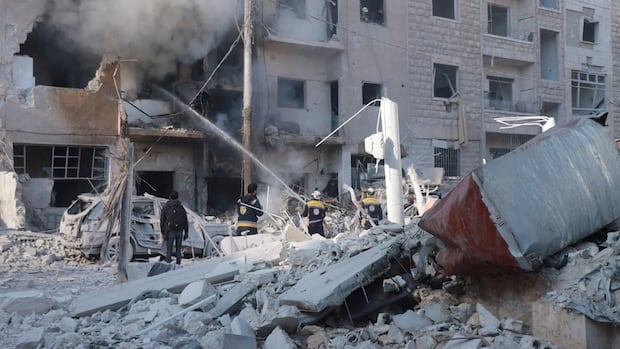Syrian government forces pull out of Hama after rebel advance
Hama fighting follows surprise capture of Aleppo last week

Syrian rebels ousted pro-government forces from Hama on Thursday, bringing the insurgents a major new victory after a lightning advance across northern Syria and dealing a new blow to President Bashar al-Assad and his Russian and Iranian allies.
The Syrian army announced that the rebels had entered Hama after intense clashes and said it was redeploying outside the city "to preserve civilians lives and prevent urban combat."
Rebels said they had taken districts in the city's northeast and had seized the central prison, freeing detainees.
Rebels said they were preparing to keep marching south towards Homs, Syria's great crossroads city that links the capital Damascus to the north and coast.
"Your time has come," said a rebel operations room in an online post, calling on city residents to rise up in revolution.
Al Jazeera television broadcast what it said were images of rebels inside the city, some of them meeting civilians near a roundabout while others drove in military vehicles and on mopeds.
The rebels took the main northern city of Aleppo last week and have since pushed south from their enclave in northwest Syria, reaching a strategic hill just north of Hama on Tuesday and advancing toward the city's east and west flanks on Wednesday.
Hama has remained in government hands throughout the civil war, which erupted in 2011 as a rebellion against Assad. Its fall to a revived insurgency would send shockwaves through Damascus and its Russian and Iranian allies.
The city lies more than a third of the way from Aleppo to Damascus and its capture would open the road for a rebel advance on Homs, the main central city that functions as a crossroads connecting Syria's most populous regions.
Inside Hama, the scene of an Islamist uprising that the Assad dynasty crushed in 1982, the internet was cut off and streets emptied on Wednesday according to a resident whose family remain in the city.
United Nations Secretary General Antonio Guterres said on Thursday there is an urgent need for immediate humanitarian access to all civilians in need in Syria and a return to a UN-facilitated political process to end the bloodshed.
He urged "all those with influence to do their part for the long-suffering people" of Syria and said all parties are obligated to protect civilians.

Rebel leader warns Iraqi PM
The most powerful rebel faction is the militant Sunni Islamist Hayat Tahrir al-Sham (HTS), the former al-Qaeda affiliate in Syria. Abu Mohammed al-Golani, its leader, has pledged to protect Syria's religious minorities and has called on them to abandon Assad, but many remain fearful of the insurgents.
Golani on Thursday in a video statement urged Iraqi Prime Minister Mohammed Shia al-Sudani not to allow the country's Iran-aligned Popular Mobilization Forces (PMF) to intervene in Syria.
The PMF, known as the Hashd al-Shaabi in Arabic, contains many Iran-backed armed factions that previously fought in Syria to help Assad retake territory that fell to rebels in the early years of the Syrian war.
"We urge and hope Iraqi politicians, first and foremost Mohammed Shia al-Sudani … do their duty to prevent the Iraqi Hashd al-Shaabi's intervention in what is happening in Syria," Jolani said.
The PMF has said that it is not deployed in Syria, and commanders within it have said they would only do so on orders from their leadership.
Reuters reported earlier this week that several hundred Iraqi militia fighters had deployed to Syria to help the government fight rebels who seized Aleppo last week.
Golani said the fighting in Syria would not expand to Iraq, as rebel forces wanted strategic economic and political relations with Baghdad after achieving their goal of overthrowing the current Assad regime.
On Wednesday, Golani visited Aleppo's historic citadel, a symbolic moment for rebels who were driven out of the city in 2016 after months of siege and intense fighting, their biggest defeat of the war.
Turkey denies involvement
Sudani said this week Iraq would exert all efforts to preserve the security of both that country and Syria, according to the official readout of his call with Turkish President Tayyip Erdogan.
Aleppo was Syria's biggest city before the war. HTS and the other rebel groups are trying to consolidate their rule in Aleppo, bringing it under the administration of the so-called Salvation Government they established in their northwestern enclave.

Aleppo residents have said there are shortages of bread and fuel and that telecom services have been cut.
The rebel forces advancing on Hama have included a Turkey-backed insurgent coalition called the Syrian National Army, which holds a strip of territory along the Syrian-Turkish frontier, rebel sources said.
Turkey, which designates HTS as a terrorist organization, has long been the biggest external backer of other rebel factions and its role will be critical to the future of any enlarged insurgent region in Syria. Ankara has denied having taken part in the rebels' sudden sweep into Aleppo last week.
